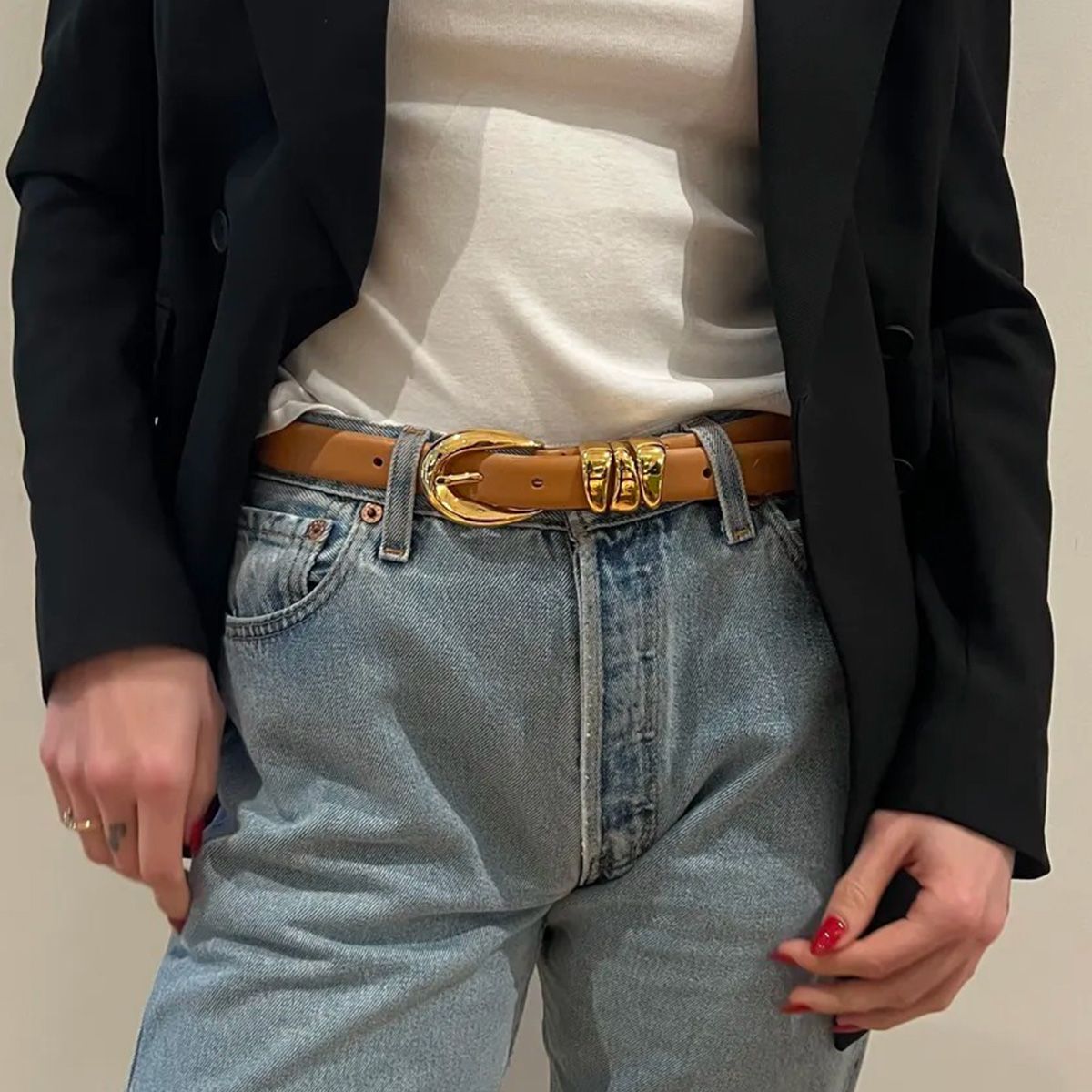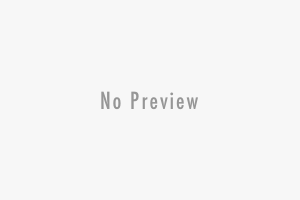The feature directorial debut from Métis filmmaker Berkley Brady, Dark Nature is an anxiety-inducing horror-thriller set and filmed in the vast Canadian Rockies almost entirely with practical FX and real stunts.
The film follows Joy (Hannah Anderson, What Keeps You Alive), a survivor of domestic abuse, and her friend Carmen (Madison Walsh, Don’t Say Its Name) as they venture out to the Canadian Rocky Mountains on a weekend retreat with their therapy group. They journey deeper into nature’s isolation, and trauma tricks the mind as the women are stalked by a reality that’s far more terrifying.
After catching the film as part of the Fantasia Film Festival, I had the chance to speak with Dark Nature‘s director and co-writer, Berkley Brady. She was an absolute delight as we spoke on Canadian survival, respectful storytelling, and multiple dimensions.
Kelly McNeely: Where did this idea come from? And how did Dark Nature itself manifest?
Berkley Brady: Well, it came from many different places, many different conversations with different people, friends, and it really started with my friend David Bond. I call him my horror sensei, because he just lives and breathes horror. He was really the one, because I came from film school, and Mike connected me with him. And I was like, “Horror? I don’t know. Yeah, it’s okay. I like these ones and these ones…” and he’s like, “No, this is why horror is important, this is why it actually allows the freedom for artists to explore the entire human condition, this is how we’ve been persecuted as people in horror culture, this is the history starting with these monsters and these writers… it’s a cult, it’s a secret society, there’s blood rituals, like get with it!” [laughs]
I was like, okay, okay! And so he really put me through an education. And I just became really passionate about horror, and I realized I actually always had been, but I felt like I didn’t know there was the horror community, it was sort of like a secret thing I had, that I loved. And then obviously, like, one of my favorite movies is The Descent. I know it’s a favorite for many people. Love that movie.
I also love melodramas like Beaches. And I love to cry. I love Douglas Sirk, like Imitation of Life. I just want to cry, I want to be allowed to just follow a story and care about these people. And also in terms of horror, I was thinking, how can I create something that’s set in the Rockies and explore dynamics that I’ve seen, or that are interesting to me? So like, dynamics between groups of women are really interesting to me. I think friendship is a huge motivator in my life and I’m just very passionate about friendship and my friends. And then survival and adventure. I love a good survival tale. 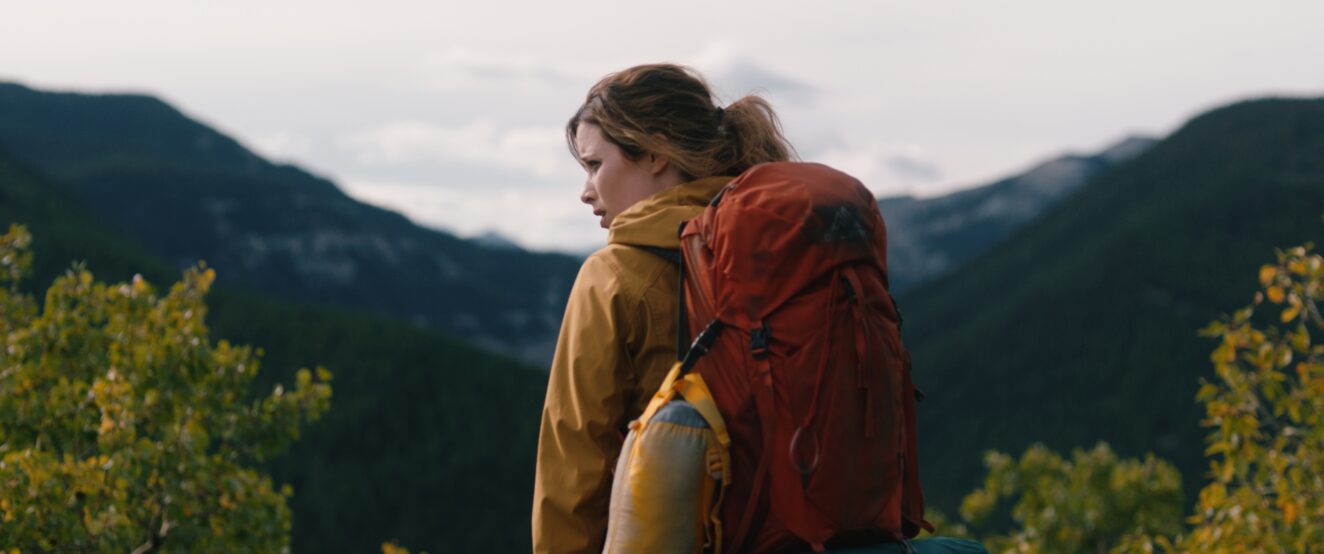
Kelly McNeely: Absolutely. Margaret Atwood wrote that book called Survival, that’s about Canadian literature and how survival and victimhood and and nature are such huge prominent themes in Canadian literature and media, which I think is so cool. When I watched this, it really made me think of that book and about survival. It feels very Canadian as well. Can you speak a little bit about bringing that Canadianness into it, and those themes of nature and survival?
Berkley Brady: Yeah, I forgot about that book. But you’re right. In fact, I read that book and for a long time with my writing, I was like, “well I’m not gonna write survival stuff then”. Like I almost went against it. And that’s funny that I forgot that and then went right back [laughs]. I love her essays and her philosophy.
So I think, living in New York – I lived in the States for almost seven years – and I really came to that place where I was like, am I going to live here now? Am I going to try to make it here and not come back to Canada? And then I fell in love with a Canadian gentleman and ended up marrying him here. And so I came back and just embraced it.
I also had the really amazing opportunity to work with Cree elder Doreen Spence here in Calgary. She runs and prepares people for vision quests. And so I did a little documentary about a friend of mine going through that process with her. And also I was able to spend a lot of time with the author Maria Campbell. She’s a Métis author, and she actually knew my great uncle, James Brady, was also a Métis activist in the mid century.
And so I really was like, well, if I’m here in the States, no one even knows what Métis is. You say you’re Métis and they’re like, what is that? I’ve never heard that. And then coming back here it’s like, that’s what I missed in the States. I missed – obviously my family – but also just the Métis people, and the Indigenous people who are here in Canada, especially Cree people. I grew up always with a lot of Cree people around, and I just miss being around them.
So I think that was something I just wanted to really dive into. And to do it from my perspective. Because I’m very Celtic as well, so I grew up throughout life with a lot of, like, white privilege. So just my mashup of what it is to be Canadian is hopefully always going to be a part of the stories I tell.
Kelly McNeely: I think that within cultures – Indigenous cultures especially – the storytelling is so rich, all the mythology and the folklore, which really plays into Dark Nature in a big way. Can you talk a little bit about the creature design of the film?
Berkley Brady: Yeah, yeah. So one thing that was really important to me was – because this is a work of imagination, I did not want to use any creatures or mythologies that belong to any Indigenous groups. So I really was very, very, very cautious about like, this isn’t a Wendigo, but of course, I’m aware of that story. And I really wanted to make sure this was something that I imagined in my mind. I feel like it’s really important as storytellers that we are allowed to invent things, and to have imagination.
And so, for me, the creature is very much something that is very local to this spot. I have a sort of mythology myself as to how it arrived. I think it came through dimensions, and it’s like an interdimensional creature that sort of got stuck here in this cave, and it’s been so long that it’s slowly become the place. And that it has aspects of mammals. I think it’s really interesting how mammals – because we need to care for our young – connect well with other mammals. We know how to care. And that doesn’t mean you also can’t be a predator. And so I wanted it to be based on predators of the area and very much like the bark and the stones, just like any animals so localized to its environment.
And then I was really lucky to have Kyra MacPherson. She’s the most insanely talented makeup artist and she does a lot of silicone carving, and the costume designer Jen Crighton is also an artist, so she was able to sew the fur to make it look like that. So those two women, just after talking to me, they – together – made that monster suit.
Kelly McNeely: And Dark Nature alludes to the history of people going there for sacrifice. I thought that was a nice way to introduce that mythology of the story.
Berkley Brady: That was the hard part, to do it without stepping on toes or insulting anybody or being fake about it.
Kelly McNeely: It feels like its own thing. And I love the way that it looks very “of nature” as well, which is interesting when you talk about the inter-dimensionality of it. It’s just adopting what it finds, which is really cool.
Berkley Brady: Yeah, yeah. And then also has an interdimensional power; it can target you.
Kelly McNeely: Yeah, I love that it’s playing into the trauma, and how trauma and horror come together. There’s a line, “You’re more capable than you ever imagined”. The idea of dealing with trauma through horror. When you look at horror films, and films led by women – like in particular, you look at the final girl – a lot of it is dealing with the experiences of horror, and coming out on the other side of it a stronger person. I wanted to ask about this creature that preys on trauma and how that kind of came into the story, and that discovery.
Berkley Brady: It definitely was a discovery. It’s something that I was really working through. And thanks to David Bond, and [producer] Michael Peterson, and [writer] Tim Cairo, they were all part of helping with the story and really pushing me to answer some of those questions. So I do think there’s something interesting when you watch a horror film, and then you’re left with whoever survived, like, well, they’re gonna be messed up! That was pretty traumatic. And it’s like, what happens if you just took that as a given, that they already are? Because they are women who lived through life [laughs].
So it’s like, what if you took that and then put them in a situation. And in terms of storytelling, I think the goal for me is always like, I want to put my characters in a situation that would be the most terrible for them, or the most challenging for them. And so I imagine that this creature, no matter who you are, you are going to get triggered, or you’re gonna get eaten, you’re gonna be hunted, if you are in this monster’s territory. But nothing could be worse for these women in particular, because it triggers the very fears that they’re there to face. So I thought that that was sort of powerful, just on a story level.
I think the notion of the final girl and looking at the thing that has helped me most get through difficult times in my life, are my friends. So what if instead of having a final girl, what if there could be final girls? Because we’re the ones who help each other through. But to show that that’s not always easy. Helping friends through hard times, and being there for each other, being this great friend, can also really hurt you. If you love someone who’s hurting themselves or been hurt, it doesn’t stop with them. Everyone gets burned, sort of, but it’s part of life.
Kelly McNeely: It’s part of the balance of friendship. I like that the two main characters have that kind of balance, that they are there to support each other. But there is that knowledge that like… just let me help you! You know? You just have to let me help you through this. And they bring that element into it. Because whenever there’s hard times going on between friends, there’s always that resistance, and it’s like, please just let me help you! [laughs]
Berkley Brady: Like, do you, but don’t do you! [laughs] 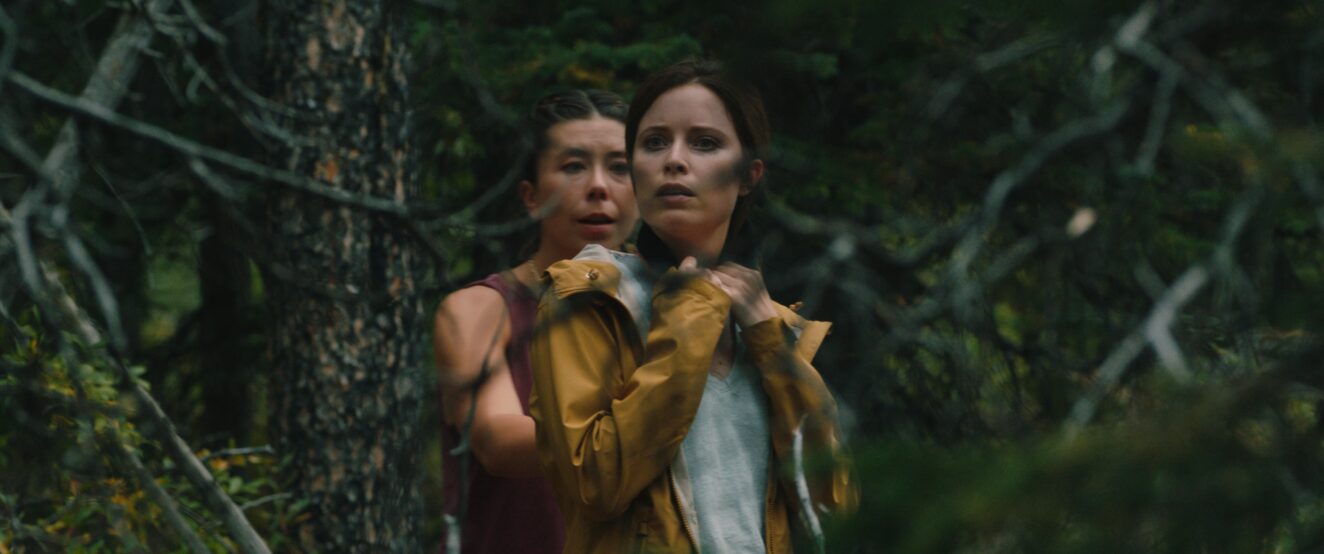
Kelly McNeely: In terms of the filming location, what were the challenges of filming in what I assume is a very remote and isolated location.
Berkley Brady: Yeah! Thank you my crew, you guys are like soldiers. Amazing people! So tough. I think the hardest parts are in some ways the exposure. We were really lucky with the weather, but even just being out all day, it wears you down. You’re in the sun, you’re in the wind, it just tires you out, but in a different way. Then there’s the travel to and from, before a long day and after a long day. That’s really challenging, getting to some of those spots. It was about a 20 minute hike, with equipment. So I know for some people that was a really big challenge.
I have a lot of experience out there, so I’m very much like, I do not need anything on me. I will take my script, my shot list, and my little sides for the day in my pocket, and a water bottle, and get everything else off me. But there would be some people who have to bring a chair and computer, because that’s part of their job. Like the script supervisor. She needs those things. But I was also like, I think you need to not bring your chair, because you can sit on a rock. You need your hands to climb through these certain parts. And yeah, I think at the beginning everyone was just like, “wow, this is so beautiful, we’re here, we’re so excited!” And by the end they’re kind of like, “this place yet again” [laughs].
But I’d say just for if there are filmmakers reading this, I’d say it’s things like having Wi Fi service or cell service. When you don’t have that, there’s so many producing aspects that you need that access. So the producer has to leave to go do that. Or if you have a piece of equipment that breaks, you can’t just send the PA to go to the store, you’re done for the day. Stuff like that was really challenging.
Kelly McNeely: Gosh, I can imagine. It looks gorgeous, though! But I was thinking about that, as I was watching it through the second time, I was like, that must have been a pain to get there; the hike, the trek, and the drive as well, that must have been substantial.
Berkley Brady: My mind was sort of like, well, what we don’t have for a budget, we will make up for it just through sweat equity [laughs].
Kelly McNeely: I also love the sound design. I thought it was really neat, those ringtone pulses.
Berkley Brady: Yeah, exactly. Because it’s the text message that brings her back to the present from that first thing. And so those texts and that sound, and even the texts being a symbol for a message from a friend. So it’s like, come back to Earth. So that is a device, as it is with the lighter. So those were definitely intentional.
Kelly McNeely: The caves that you were in, were those found, or was anything built for that? Because it’s such an enclosed space.
Berkley Brady: So the exterior of the cave is a real location and was really challenging for everyone to get to. We had a safety coordinator, and then he actually got hurt the day before, not because of the cave, it was a random accident. He snapped his Achilles just walking up a hill. And so that was a very difficult thing for everybody.
And then the interior of the cave was in a warehouse. So our art director and production designer Myron Hyrak, he is incredible. He blew my mind. And he was also such a cool person to work with. And his whole team, Jim, Taylor, Sarah, there’s just this amazing art team. Every time I saw their faces, I was like “Yes! The art team is here! It’s gonna be good!” Whatever they did was good. They used old paint that they got from the fire department, tarps, pallets that were free, and just built this thing in the warehouse. All the interior of the cave is a warehouse.
And it’s such a leap, right? As a director, I meet someone and he’s like, I’m going to build your cave for you. I’m like, I have no idea how you’re going to pull this off on your budget. And he was just like putting pictures up on the wall that it gave him as reference, textures. So we had textures from the exterior cave for him to sort of keep in mind. He took rocks from the real caves, he always had those things to look at. We ended up getting bones and skulls, there’s someone we rented just like a tarp full – like a big giant, like, thing – of skulls and bones. That was something that – as it came together – my jaw was dropping. I could not believe it was working that well.
Kelly McNeely: As a filmmaker, particularly as a horror filmmaker, what inspires you?
Berkley Brady: Fear! I think movie wise, The Exorcist. Alexandre Aja’s movies, like High Tension, I’m just like, damn you Alexandre Aja! Why are you so good? Everything he does.
Of course, The Descent, movies like that I think pull you in, the way they play our fear so perfectly, like an instrument. To let it out and then we don’t have to carry it ourselves. So when I’m in the real world, I’m very attuned to things that seem to scare me. Things that can be perceived as different than they are. I find that really fascinating. You know when you think you hear something, but it’s actually something else? So I’m always collecting those little moments and looking for things that are engaging. It’s almost like collaging, in some ways, I feel like it’s pulling all these things into something until it’s like, that’s the idea!
I had a photography teacher in film school, and he did this thing where you take pictures, and you take your pictures for the week and develop them in the darkroom. And then when it’s your turn, you put them up on the wall. And then the whole class looks at them. So you put like, 10 of your prints up on the wall. And then you say which one you want to talk about, of these prints, which is the one that’s your art for the day? And then he asked the class, which one is it? And it’s usually not the same one. Because as artists, we can be so attached to the process of making it, our idea behind it, but at the end of the day, it’s a picture on the wall, and other people see something different.
So the other thing he said too, is if you are making stuff that you’re eager to share with your family, like you’re not… you should be embarrassed. You should be cringing if you thought your mom saw this. Or you should be exposing something of yourself that is hard to show, or else what are you doing? It’s bland. So I think that I’m also always looking for it to push myself to, like, what’s uncomfortable for me to share, or what’s uncomfortable to think about? And then pushing myself to go there. 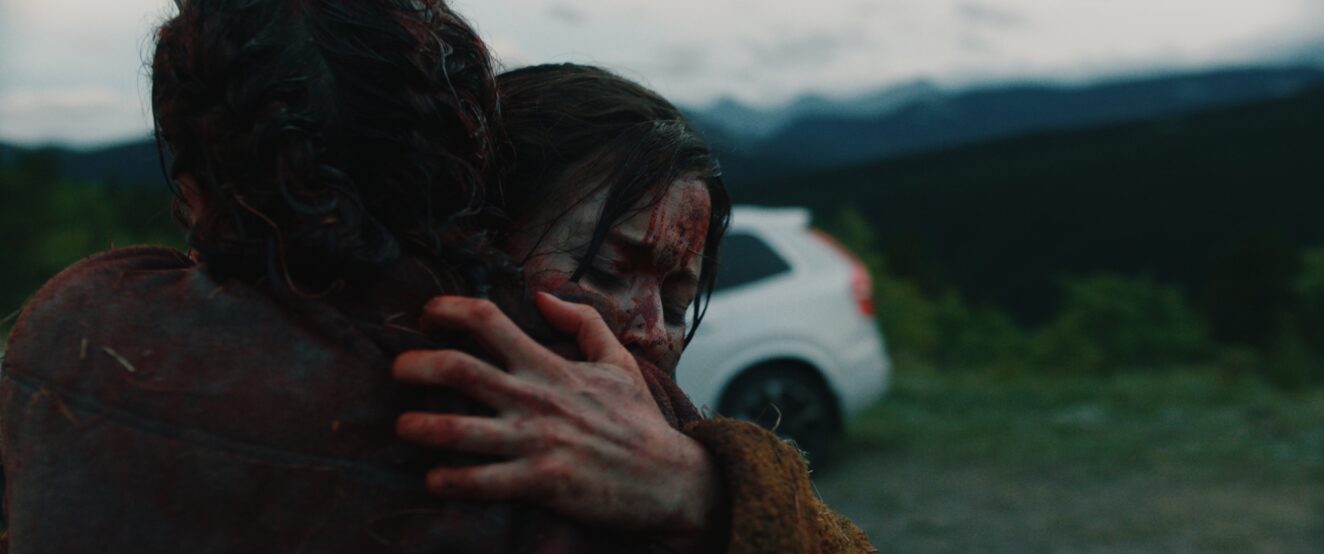
Kelly McNeely: What’s next for you?
Berkley Brady: Talking to my manager yesterday, I’m like, I’d really like to take August off, because I haven’t really had a proper mat leave since I had the baby in March. I was pregnant during the shoot. I was in my second semester during production, had the baby during post production, and our first sound spotting session was three days after the birth. I have a picture of myself with like, this tiny little newborn, in front of my laptop with headphones. I was really lucky that – especially Mike Peterson and David Hyatt, our editor – also helped a lot with production and post production, they just took on more of a burden than normal. They have not made me feel bad about it, which is big props to them.
But I have been writing another project that I’m really excited about but I can’t really talk about right at this moment. So I’m really hoping to actually just take a little break and be with my baby. And I’ve got another horror movie that I have an outline for, so I’m sort of just in that collecting phase to do it. And then hopefully, I’ll be directing some more TV coming up as well.
Kelly McNeely: Congrats on the new baby, by the way! And wow that’s impressive that you were still hiking and filming during that time.
Berkley Brady: Thank you! It was the second semester and I was lucky I had an easy pregnancy. And that’s no props to me, that was just luck. But I would just say, you can do so much more when you’re pregnant than maybe people think, so I really want to put that out there too. Pregnant people are actually really powerful, like you have exposure to these stem cells and this creation, so it’s like, I felt kind of like the intelligence of what was happening without my mind, just that what my body could do. That gave me confidence to think like, I’m capable of more than I can even comprehend. I think it’s like a powerful thing to be pregnant and on a sheet.
Kelly McNeely: Absolutely. You’re literally building a life while you’re running around and doing all the things that any other person is doing. But you’re doing it while you’re building a person.
Berkley Brady: Yeah! Just like the ancient intelligence of that. To just be a bystander to it happening. It’s like, okay, I eat and I take my multivitamin, and I drink water, but other than that, I’m not doing anything, and yet fingers are differentiating, cells are making choices and things that have to happen. It’s just like, the power of that! And it is so ancient, the power of that. It’s just like, we do not know anything. That’s what I think. The body is crazy.
Kelly McNeely: And the human mind is so complex, and just the universe and all of everything. I was looking at the new images from the James Webb telescope, and we are just so insignificant! Everything’s gorgeous and crazy.
Berkley Brady: I know, I know! But also that we could look at that and think about that. Also, that’s why dimensions are just so interesting to me, because they say there’s 11 dimensions, but then after 11 they flop back to one. It’s like, what does that even mean? That we can see that and think of it, and have memories, and dreams, and all these things. And I think that will always be interesting to explore.
You can watch a clip from Dark Nature below, playing as part of the Fantasia International Film Festival’s 2022 season!


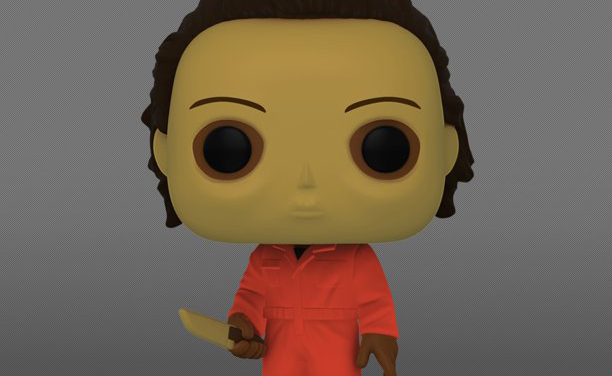

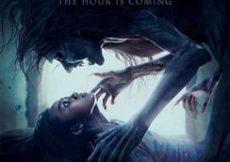
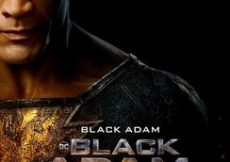
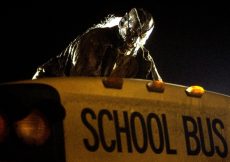
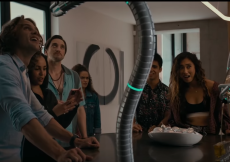
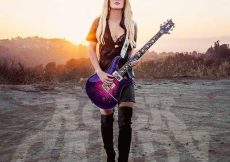
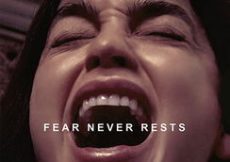



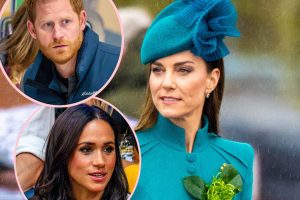











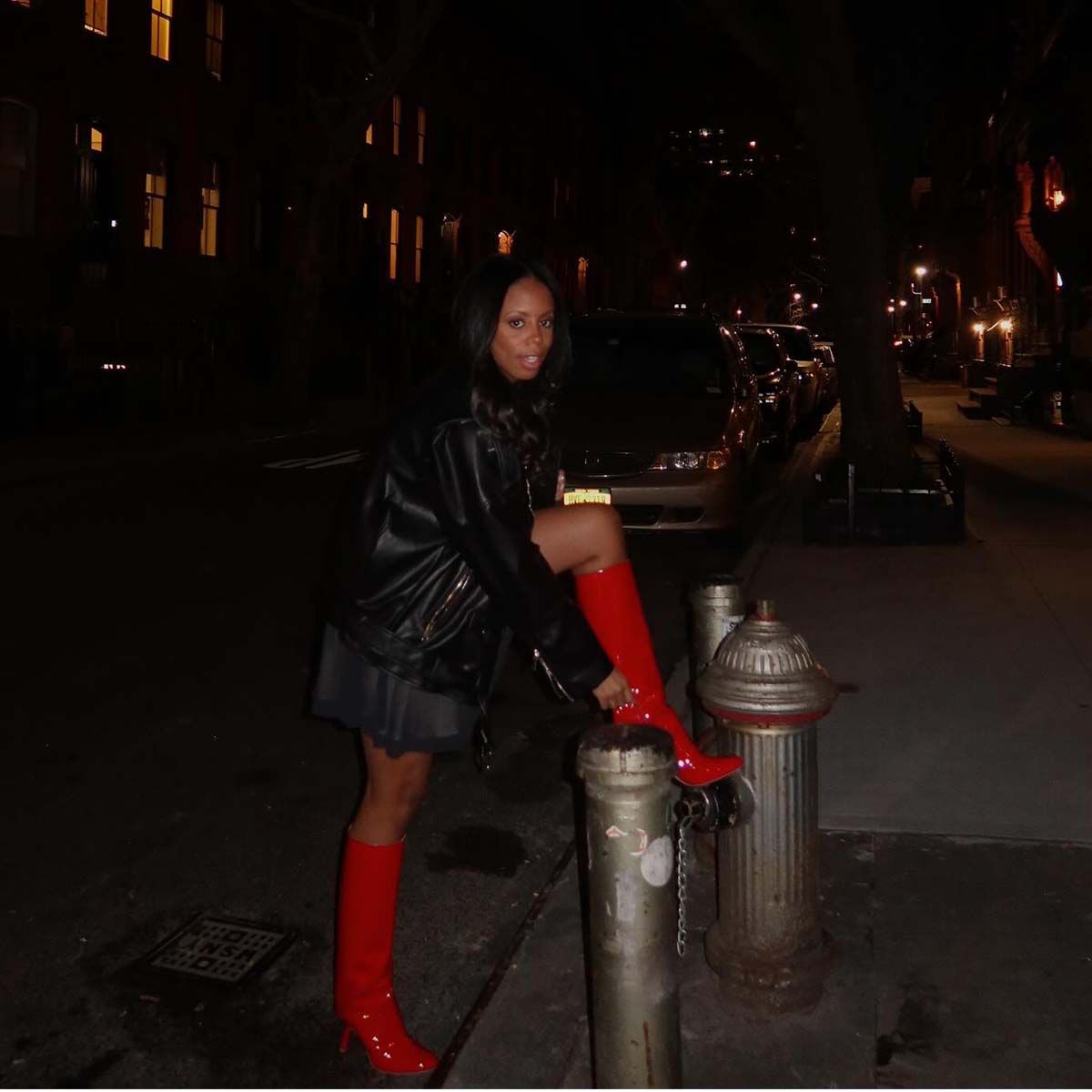
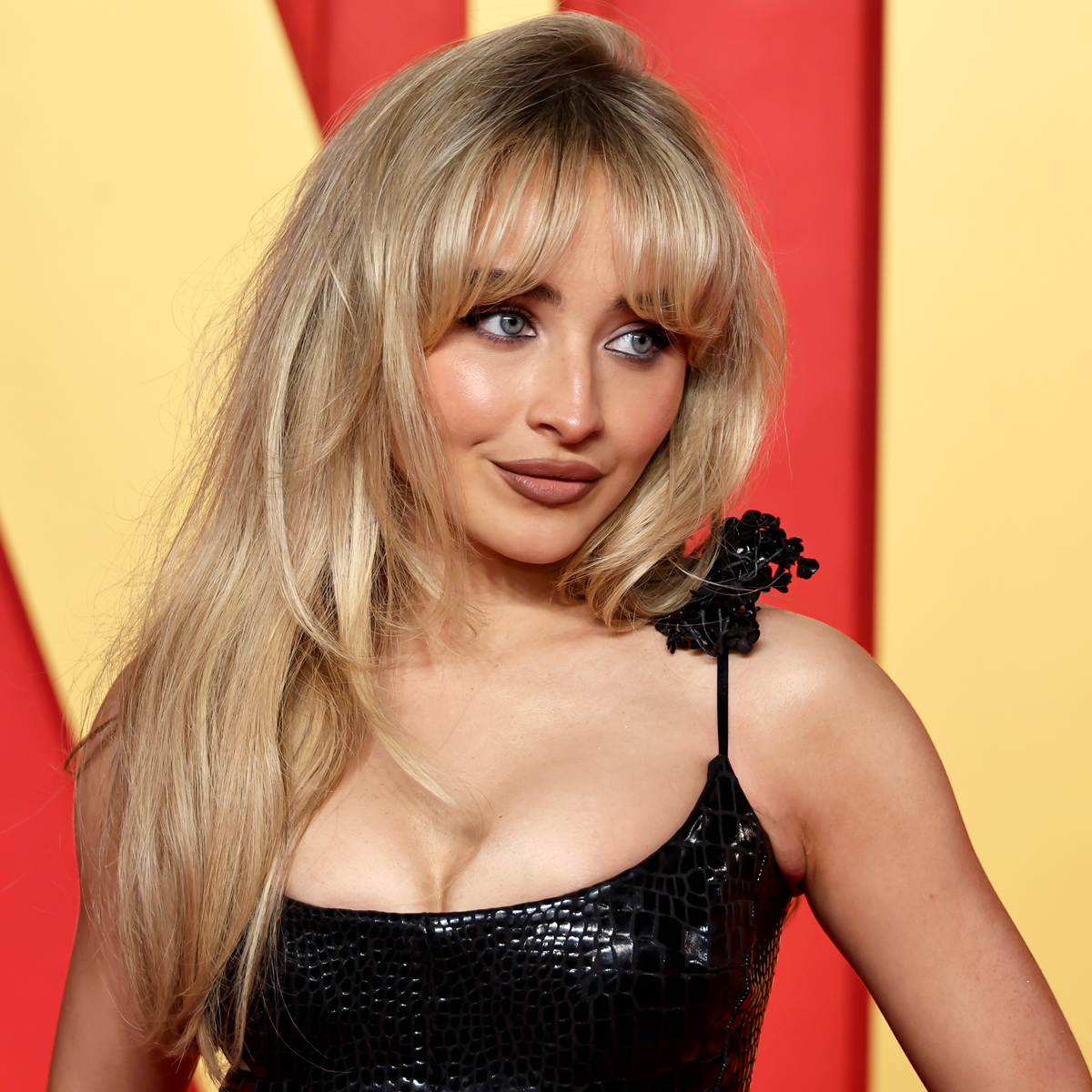
:quality(85):upscale()/2023/05/11/976/n/1922564/782262e2645d6b967847b4.74342194_.png)
